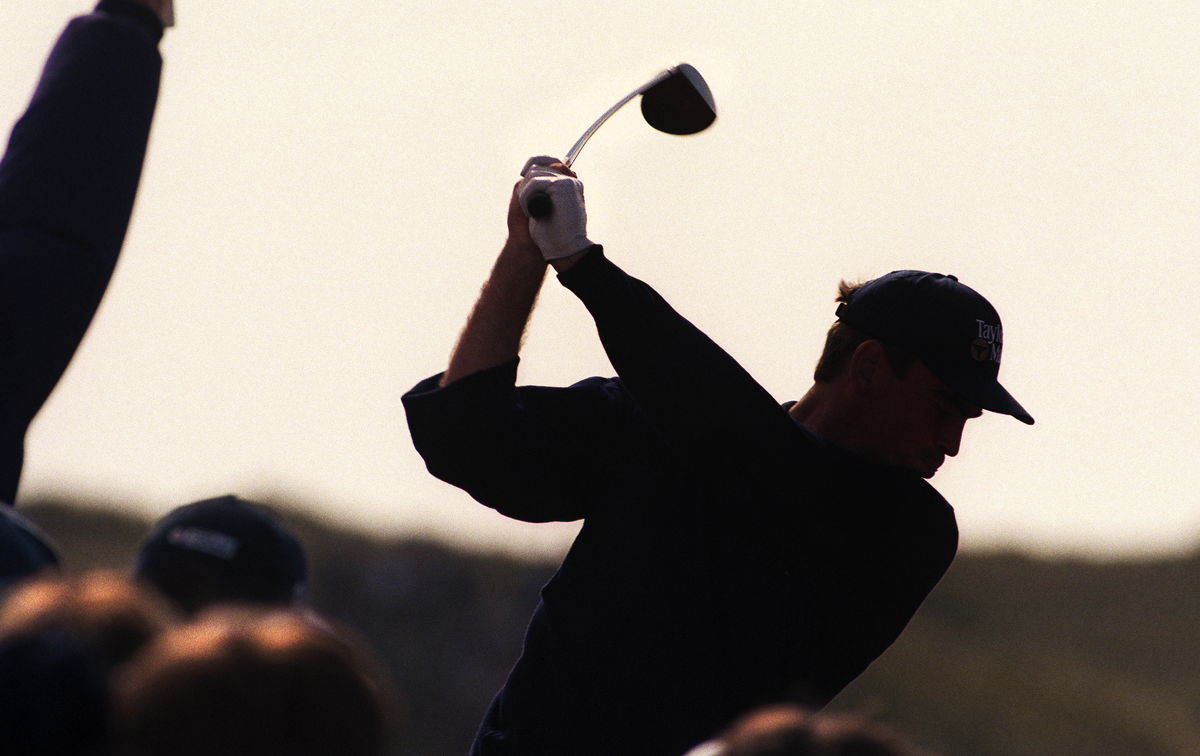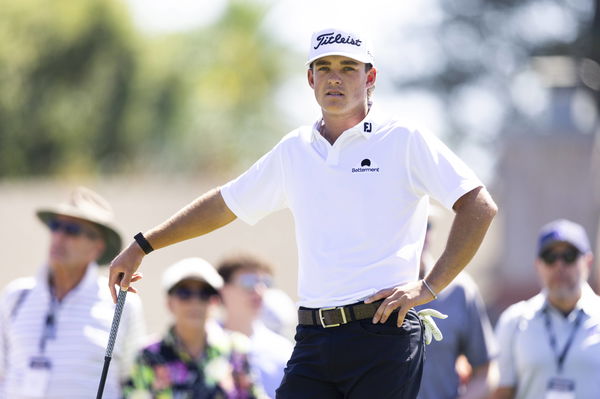
Getty
Silhouetted golfer on the tee during the 127th British Open Golf at Royal Birkdale GC in Southport 16th-19th July 1998. (Photo by David Ashdown/Getty Images)

Getty
Silhouetted golfer on the tee during the 127th British Open Golf at Royal Birkdale GC in Southport 16th-19th July 1998. (Photo by David Ashdown/Getty Images)
Earning a PGA Tour card should feel like winning the lottery. For most amateur golfers, it represents the culmination of years of dedication, sacrifice, and relentless practice. But what happens when achieving that dream terrifies you more than it excites you?
Watch What’s Trending Now!
That’s the reality Jackson Koivun is grappling with right now. The world’s No. 1 amateur golfer earned his PGA Tour card in May 2025 through the PGA Tour University Accelerated program. He became only the third player ever to accomplish this feat. Yet weeks later, he’s still an amateur, still competing in college tournaments, still delaying the professional leap that most would take without hesitation.
During a recent appearance on the No Laying Up podcast, Koivun opened up about what’s really keeping him from turning pro. It wasn’t swing mechanics or course management. It was something far more personal—the crushing loneliness of professional golf.
“Once you get out on the PGA tour, you’re on your own and it’s a lot of sitting in your hotel room by yourself at night.”

Imago
September 13, 2025, Napa, California, United States: NAPA, CA – SEPTEMBER 13: Jackson Koivun of the United States waits to tee off on hole 1 during the Procore Championship 2025 – Round Three at Silverado Resort on September 13, 2025 in Napa, California. Napa United States – ZUMAt139 20250913_aaa_t139_087 Copyright: xAlxChang IsixPhotosx
Koivun has talked extensively with young pros who recently made the transition. Their warnings were consistent. The travel schedule is brutal. The alone time is overwhelming. Aside from the physical, your mental game also needs to be very mature to handle that life.
And it’s not just Koivun; many other players and veterans have also addressed this hardship in the past. For instance, a young Rory McIlroy once said, “Sometimes life on tour can get a little bit lonely at times and you want to have guys that you can go for dinner with and you’ll have a laugh with in the locker room.” The contrast between professional golf with college golf is stark and shocking.
In college, you travel with teammates who become brothers. Coaches handle logistics, getting you from point A to point B. You share meals, crack jokes, celebrate wins together, and support each other through losses. Previously, Koivun described college golf’s intimidation factor as players fighting for teammates they love.
Then you turn pro. Suddenly, all that support vanishes overnight.
“Some people love it, some people don’t and you kind of got to learn to love it if you want to succeed out there.”
This isn’t just Koivun’s anxiety talking. The professional golf landscape is littered with cautionary tales of young players who struggled with the isolation.
When the protective bubble bursts
The college golf system creates a protective ecosystem that doesn’t prepare players for professional reality. At Auburn, Koivun swept all four major collegiate awards as a freshman. He led his team to an NCAA Championship. He had coaches, trainers, academic advisors, and teammates surrounding him constantly.
Professional golf lacks that infrastructure. You’re an independent contractor competing against everyone, including your friends. Miss a cut and you don’t get paid. Hotel rooms become prison cells. Weeks blur together in a haze of airports, rental cars, and unfamiliar cities.
Aaron Wise knows this reality intimately. The 2018 PGA Tour Rookie of the Year withdrew from the 2023 Masters to focus on his mental health. “Golf is just as much a mental game as it is one of physical skill, and the mental piece of it has been a struggle for me recently,” Wise had said.
His rapid rise from PGA Tour Canada to the Korn Ferry Tour to the PGA Tour left him unprepared for the mental demands. He took nearly two years away from competitive golf.
Chris Kirk battled alcohol abuse and depression, later admitting he had “all those bad memories of sitting by myself in a hotel room.” He now organizes rental houses at tour events with fellow Georgia Bulldogs just to avoid isolation.
The statistics paint a grim picture. A 2022 study of European Challenge Tour players found that 51.7% experienced symptoms of distress, over three times higher than the general population. Among those who experienced mental health issues, 67% never sought professional help.
Most devastating was Grayson Murray, who died by suicide in May 2024 at age 30. His parents revealed that their home was his sanctuary. During depressive episodes on tour, he would isolate himself for days.
Dr. John Fry’s research with professional golfers found a recurring theme: loneliness. Players repeatedly used that exact word when describing tour life. They face high psychological demands, low social support, and profound isolation at various career points.
Koivun understands these realities. He’s choosing patience over haste, giving himself time to mentally prepare for the solitary grind ahead. At 20 years old, he has his entire career ahead of him. The question isn’t whether he’ll succeed among the pros—it’s whether he can embrace the loneliness that comes with it.







